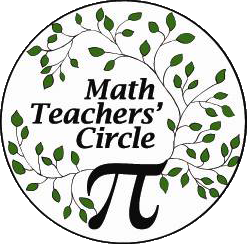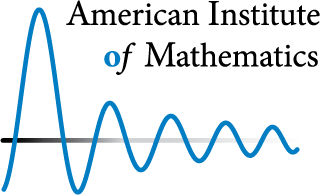Frequently Asked Questions
Questions about Math Teachers’ Circles
What is a Math Teachers' Circle (MTC)? Math Teachers’ Circles are groups of K-12 teachers and mathematicians who meet regularly to work on rich math problems. The goals are to engage teachers in actively doing and discussing mathematics, and to build a community of mathematics professionals dedicated to improving education for all students. Who participates in Math Teachers’ Circles? Each Math Teachers’ Circle includes approximately 15 to 20 teachers at the elementary, middle, and/or high school level. Groups also include several mathematics department faculty members from a college or university, or other professional mathematicians from academia or industry. How often do Math Teachers’ Circles meet? Math Teachers’ Circles meet 6 to 8 times each academic year. Doing mathematics is the primary focus of each meeting. Meetings are 2 to 3 hours in length, including a mathematics session that is at least 90 minutes long, some time to socialize, and (at the discretion of the leadership team) some time devoted to pedagogically oriented discussion or activities. New Math Teachers’ Circle receiving support from the Math Teachers’ Circle Network are also expected to hold an initial intensive workshop of at least 3 full days (See below: “What is an immersion workshop?”). We will sponsor a mentor from another Math Teachers’ Circle to help lead the initial workshop. What is a Math Teachers’ Circle meeting like? The best way to answer this question is to experience one. We recommend that you check out our videos. We are also happy to help coordinate an in-person or virtual visit to a Math Teachers’ Circle meeting if you contact us. The MTC Network sponsors an in-person visit to a nearby Math Teachers’ Circle for all new Network-supported MTCs. What is an immersion workshop? An immersion workshop is an intensive experience focused on mathematics and creating community. It is recommended as the first “big event” for a new Math Teachers’ Circle. Workshop length can vary from 3 to 5 days. For a sample immersion workshop schedule, please visit http://tinyurl.com/5dayschedule. What is the Math Teachers' Circle Network? Founded in 2006, the Math Teachers’ Circle Network is a project of the American Institute of Mathematics (AIM) in San Jose, CA. The Math Teachers’ Circle Network organizes Math Teachers’ Circles around the country and provides support and resources to new and established Circles. What are the benefits of joining the Math Teachers’ Circle Network? There are many, including: What if we don’t want to apply for support to start our MTC? Can we still be part of the MTC Network? Yes. Please send a brief statement of the plans and goals for your Math Teachers’ Circle to Brianna Donaldson, Director of Special Projects at AIM, at brianna(at)aimath(.)org. Please also include a list of the schedule, topics, and session leaders for your upcoming meetings, if available. We're having trouble starting or running our Circle. Can you help? Definitely. We are always happy to hear from our Member Circles and to help however we can. We will do our best to either assist you ourselves, or to connect you with others in the Math Teachers’ Circle community who can help. Please feel free to contact us anytime. Some common questions and problems we help with include: Who is on a leadership team? A leadership team consists of at least two K-12 mathematics teachers and two college or university mathematics faculty members. Can a math coach or math professional development coordinator be part of our leadership team? Yes! In fact, we encourage you to seek out teachers (or former classroom teachers who are now coaches or professional development coordinators) who have extensive connections with the local teaching community and can help recruit other teachers for your MTC. Can a mathematics education faculty member be part of our leadership team? Yes, but at least one person on your team must be a mathematics faculty member with a permanent (or tenure-track) appointment in a college or university mathematics department. Can a lecturer in the mathematics department be part of our leadership team? Yes, if he or she is a permanent lecturer or a lecturer whose appointment may be renewed indefinitely. What is a host institution? Most commonly, MTCs are hosted by college or university mathematics departments. Other possible host sites include campus-wide STEM centers, school district offices, research institutes, county offices of education, national labs, community centers, or professional development centers that serve several school districts. What commitment is required to host a MTC? At minimum, a host institution must commit to providing space for the MTC’s meetings, which typically take place 6 to 8 times during each school year. If the host institution is a mathematics department, the department must also commit to encouraging faculty members (in addition to the leadership team members) to lead sessions for the MTC. Here are some other ways a host institution can support the work of a MTC: I am the chair of our university’s mathematics department. What are the benefits to our department of hosting a Math Teachers’ Circle? An article describing the benefits of Math Teachers’ Circles for mathematicians appeared in the December 2014 issue of the Notices of the American Mathematical Society. Do you have an example letter of commitment that we can use as a template for our letter? Yes. Here is an example letter of commitment from a math department chair. What is a Circle Mentor? Circle Mentors are expert MTC leaders who are matched with new MTCs through our seed grant program. Mentors visit new Circles to lead math sessions and consult with the new leadership team during an initial workshop or other early meeting. Find a full list of Circle Mentors here. What is a Sister Circle? Sister Circles are nearby Math Teachers’ Circle that are matched with new MTCs through our seed grant program. Leadership teams of each new MTC funded through AIM will be reimbursed for travel to visit a meeting of their Sister Circle. Find a full list of MTCs here. What happened to the How to Run a Math Teachers' Circle workshops? From 2007 to 2014, AIM organized annual workshops on “How to Run a Math Teachers’ Circle,” with support from the Mathematical Association of America, the National Security Agency, and the National Science Foundation. These workshops evolved significantly over time and developed into a highly successful means of beginning MTCs, with approximately 90 percent of teams who participated in the last three years of workshops forming a Math Teachers’ Circle. With space for only 12 teams each summer, however, the workshops are not able to meet the increasing demand for creating new Math Teachers’ Circles. Furthermore, the centralized workshop model does not make the most of the distributed expertise of Math Teachers’ Circle leaders. Our new, hybrid model for starting new Math Teachers’ Circles integrates centralized Web and staff resources with a mentor network of expert leaders around the country.
Questions about the Math Teachers’ Circle Network
Questions about Starting a Circle
Leadership Teams
Host Institutions
Mentors and Sister Circles
Miscellaneous

